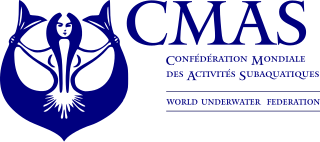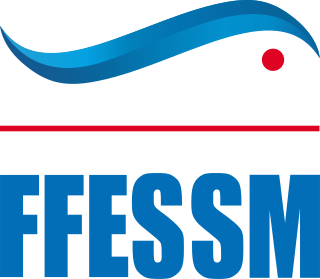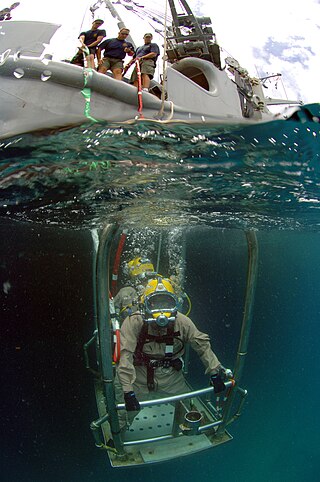Related Research Articles

Freediving, free-diving, free diving, breath-hold diving, or skin diving, is a mode of underwater diving that relies on breath-holding until resurfacing rather than the use of breathing apparatus such as scuba gear.

The British Sub-Aqua Club or BSAC has been recognised since 1954 by UK Sport as the national governing body of recreational diving in the United Kingdom.
CMAS one-star scuba diver is the entry-level diving certification for recreational scuba diving issued by the Confédération Mondiale des Activités Subaquatiques (CMAS).
The Sub-Aqua Association (SAA) is a diver training organization for scubadivers in the United Kingdom. The SAA and other UK-based diving groups have traditionally used a club-based system with unpaid instructors, while other training agencies organise most of their training programs through professional instructors and dive shops. The other major club-based diving organizations in the UK are the British Sub-Aqua Club (BSAC) and the Scottish Sub Aqua Club, and the principal non-club-based organisation is PADI.
Underwater sports is a group of competitive sports using one or a combination of the following underwater diving techniques - breath-hold, snorkelling or scuba, usually including the use of equipment such as diving masks and fins. These sports are conducted in the natural environment at sites such as open water and sheltered or confined water such as lakes and in artificial aquatic environments such as swimming pools. Underwater sports include the following - aquathlon, finswimming, freediving, spearfishing, sport diving, underwater football, underwater hockey, underwater ice hockey, underwater orienteering, underwater photography, underwater rugby, underwater target shooting and underwater video.

The European Underwater Federation (EUF) is an umbrella organisation representing the interests of scuba diver training organisations operating in both the not for profit and for profit sectors within Europe.

Confédération Mondiale des Activités Subaquatiques (CMAS) is an international federation that represents underwater activities in underwater sport and underwater sciences, and oversees an international system of recreational snorkel and scuba diver training and recognition. It is also known by its English name, the World Underwater Federation, and its Spanish name, Confederación Mundial De Actividades Subacuáticas. Its foundation in Monaco during January 1959 makes it one of the world's oldest underwater diving organisations.

The Fédération Française d'Études et de Sports Sous-Marins (FFESSM) is a French sports federation specialized in recreational and competition underwater sports, like scuba diving and freediving. It is the main diver training organization in France.
The Nederlandse Onderwatersport Bond, (NOB) is the national governing body for recreational diving and underwater sports in the Netherlands. It was founded in 1962. In 2008 there were 290 scuba diving clubs and schools with a total of 20.000 members. The NOB is a member of CMAS Confédération Mondiale des Activités Subaquatiques. The aim of the NOB is to develop recreational scuba diving in the Netherlands.
The Australian Underwater Federation (AUF) is the governing body for underwater sports in Australia.
Sport diving is an underwater sport that uses recreational open circuit scuba diving equipment and consists of a set of individual and team events conducted in a swimming pool that test the competitors' competency in recreational scuba diving techniques. The sport was developed in Spain during the late 1990s and is currently played mainly in Europe. It is known as Plongée Sportive en Piscine in French and as Buceo De Competición in Spanish.
The Spanish Federation of Underwater Activities is the governing body in the field of Spanish aquatic sports. As of 2023, the federation has 897 registered clubs and 31,828 federated athlets.
CMAS Europe is an organisation created expressly to represent the interests of Confédération Mondiale des Activités Subaquatiques (CMAS) within the European Union and in other parts of Europe by European national diving federations affiliated to CMAS.
Underwater photography is a scuba-based underwater sport governed by Confédération Mondiale des Activités Subaquatiques (CMAS) where teams of competitors using digital underwater camera systems all dive at the same saltwater ocean sites at the same time over a two-day period. The submitted digital images are then assessed and ranked by a jury using a maximum of five photographic categories as well as an overall score. The sport was developed prior to 1985 as a photographic film-based event and is currently mainly practised in non-English speaking countries.
The 14th CMAS Underwater Photography World Championship was held from April 9 – 14, 2013 in Cuba at Cayo Largo. David Barrio of Spain was announced as the CMAS World Champion in underwater photography for 2013 and received the gold medal while runners-up Stefano Proakis and Michele Davino both representing Italy respectively received the silver and bronze medals.
The Underwater Society of America (USOA) is the peak body for underwater sport and recreational diving in the United States.

The following outline is provided as an overview of and topical guide to underwater diving:
CMAS two-star scuba diver is a diving certification for recreational scuba diving issued by the Confédération Mondiale des Activités Subaquatiques (CMAS).